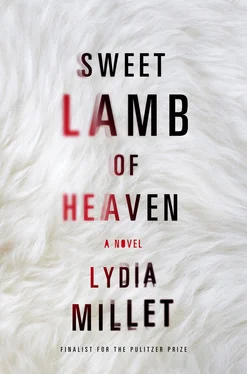Lena was intent on the patrons, and on the fourth night she hit the jackpot: a kid came in who was only a year older. He was with his father, whose attention was captured by a cell phone, and the boy too had an electronic toy, a glossy plastic robot that emitted tinny music and recorded the children’s voices to play back. The two of them traded it to and fro, giggling at the senseless insults they made the robot pronounce. Lena got so enraptured she forgot to eat.
I was absorbed in the question of Thanksgiving, whether Lena and I should visit my parents. They’re not too far from here, but on the other hand Ned knows the house. I was weighing the risks while the guests talked and laughed and Don carried food back and forth with the help of a teenage girl from down the beach. A song was playing in the background, a sad folk song about a love-struck, gunshot bandito dying alone in the hills, and I looked out over the ocean, reached to rest my fingertips on the cold window. I thought of other Thanksgivings, suffused in an amber glow.
When I turned back to the room again, my fingers still tingling, the guests all seemed familiar. It was one of those soft sinkholes of time when separate elements coalesce — we were a blur of sympathy, the air between us pockets of space in one great body, one saltwater being, unplumbed depths where the ancestors came from, primeval well of genes. . the feeling stretched like a generosity, the gift of oneness. Who cared about those differences we had, those minor distinctions that kept us apart?
But then that lofty idea turned trivial, from second to second its shine faded. It’s your commonality that’s frivolous, I scolded myself, you want to think we’re so many eggs under the down of a nesting bird — you want to be held there forever, sheltered in the warmth of a body that watches over you. You want it as almost everyone wants it, to pretend that we’re one. To let the burden of our separation be lifted at long last.
That was all it was, I told myself: desire. Was it the case that every hopeful sentiment, each stir of communion and vision of eternity, is nothing but a projection of desire?
It’s what we want that we see, not what is , I thought. Scraped bare, we’re nothing but machines for wanting.
I felt a maudlin pity for us. Together now for the blink of an eye, I thought drunkenly, before we tread off into separate futures and one fine day, though motes of our bodies still persist, the last traces of our inner selves vanish. The private selves evanesce, the secret worlds that only we knew. The nameless company of ourself, that warm sleeve of being — goodbye, old friend.
With the voice, very rarely, I’d also felt these moments of loss, as though I was looking back at myself from somewhere past my death. At times I’d felt a cold freedom then, when my irritation faded and tears caught in my throat. The long view, the far distance of the stratosphere, clean and thin as high air. The axis where distance and closeness met, the axis on which the world spun.
But back then, at those rare times of elevation, the common ground had felt like truth. Now it was only a wish.
Drunkenness, I thought, could pass for a connection to God.
At my elbow Lena was making the plastic robot dance and laughing at it. There were plenty of people around. I should have felt content but I was distant, like an elder sitting apart, watching others that spun and shrieked, so busy in the midst of life.
IT WAS AT the tail end of that golden summer when the voice went quiet, coming down off the high, that I realized we had to leave Ned. I had no more patience for his complete detachment, his reluctance to come home and rudeness when he did — a rudeness that positioned us as his unpleasant burden. In my own home I had to feel like someone else’s dead weight, and I couldn’t keep carrying it. We had to leave Ned and the string of young women in whose name he missed our weekly family dinners, who left their sunglasses in his spotless BMW, and after the BMW was gone, in his more electable Ford truck.
Neither the car nor truck ever contained a baby seat. Later I racked my brain trying to recall a single instance when Ned had driven the baby anywhere, but I came up with nothing.
I do remember, though, that one of his girlfriends wore lacy pink boyshort underwear, which found its way into the pocket of a jacket I took to be dry-cleaned — I hadn’t checked the pockets beforehand and the panties were handed across sheepishly afterward by a drycleaner. They hung in their own plastic bag, a doll-sized scrap of fabric dwarfed by the hanger.
The drycleaner had cleaned them for free, he said to me shyly.
By then I’d known for a while that I didn’t love Ned. But now, rather than existing in an amiable neutrality toward him which I’d tried, even before Lena was born, to cultivate and fit into the space where love should be, I’d come to actively dislike him. I turned the corner one day with nothing else to preoccupy me and caught sight of my own dislike, plain as day.
It couldn’t be talked away, couldn’t be handled in therapy (which Ned, in any case, would never have gone in for). It was as solid as a dining room table. His coldness toward me I might have tolerated for Lena’s sake, had he been any vague semblance of a father, but his dismissal of her got more and more unbearable. I had the devotional urgency of new mothers and couldn’t help feeling that a baby was a standing debt, a debt to a forming soul.
His lack of paternal feeling was unsurprising, in the end, since he’d never promised anything else. And it was true I’d forced him into parenthood by having Lena instead of getting a D&C as he wanted me to. I’d told myself that when the baby was born he’d come around a bit. I never expected him to be a candidate for Father of the Year, but maybe, I hoped, part of a circle would be described, a slow curve into warmth. Surely a real, living child would thaw his chill. It was what happened, I believed.
Now I’m not sure where I got that belief — maybe from a TV movie. I committed a cardinal error of women, by which I mean an error to which women in particular seem prone: the error of expecting someone else to change toward them, to grow into alignment. I expected love, change, and alignment from Ned, and all these expectations were baseless. The category of children was as alien to him as if he himself had sprung fully formed from the forehead of Zeus. His own dim trailer park childhood had ceased to exist after he emerged from it — in his mind, despite the odds, nearly a perfect man.
It didn’t help that around that time he was nurturing his budding interest in politics. He wasn’t a candidate yet, he wouldn’t be for a while, but he was angling, forging careful alliances. Though he’d never professed religious faith, he started attending church “for the connections.” He gathered new opinions around him like sacks he was hefting — sacks that bulged ominously, misshapen sacks full of hidden, gross things. Tired catchphrases would spring from his conversation in passing: “No handouts for welfare mothers,” say, but also, a fetus was sacred.
It was hard not to take his remarks personally when they concerned, as they often did, categories such as motherhood or women. But at the same time the remarks felt like objects to me — prefabricated items he had purchased quickly in a store, items he was busily stuffing into his shopping cart without close scrutiny.
“BURKE’S BUYING DRINKS for everyone,” said Kay, twisting in her chair to talk to me from the next table. “It’s his birthday. We only have beer or wine, but Don’s serving a pretty good Shiraz.”
I accepted the pour of wine into my glass and raised it; we toasted Burke, Gabe saying something I didn’t catch about rare hothouse flowers (Burke is a horticulturist). There was a rowdy crowd from town that night, some large-bodied, friendly-looking women out celebrating a remission; one of them had a tumor that had responded well to treatment. Everyone drank on Burke’s dime and I embraced once again the sentimental illusions offered by wine — what was wrong with them, after all? I’d clearly been hasty.
Читать дальше












